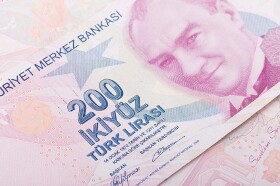The Turkish lira is slightly rebounding on Thursday after crashing to a record low against the US dollar early on Thursday. Investors are nervous about Turkeyâs response to the economic fallout from the coronavirus pandemic, as well as the decline in the central bankâs reserves. Could the world bail out Turkey once the COVID-19 crisis subsides?
The Turkish economy was already under mounting pressure before the world was shut down due to the virus outbreak. The global pandemic exacerbated Turkeyâs problems, and now the lira is trading at levels unseen since the currency crisis two years ago.
On Wednesday, the chief banking regulator announced that it would restrict foreign investor access to lira-denominated transactions. Officials are attempting to limit speculation and short-selling, but the decision triggered a selloff and temporarily sent the lira to its lowest level ever against the greenback: 7.4900.
Since the start of 2020, the central bank has burned through $20 million from its foreign currency reserves to purchase the lira and boost it against the dollar. By the end of April, the central bankâs gross reserves stood at a two-year low of $86 million. But the issue is even worse because it possesses about $168 billion in foreign currency debt that will be due over the next 12 months. The main problem is that it depends on external financing to cover these obligations, and foreign investors have sold off $8 billion in local- currency bond and equity markets this year, which has weighed on the lira.
The government is trying to reassure global financial markets that its reserves are âsufficient,â dismissing suggestions that it would require a bailout from the International Monetary Fund (IMF). However, analysts say that it will only be a matter of time before President Recep Tayyip Erdogan changes his mind since the nation does not have the fiscal and monetary resources to endure the steep economic downturn.
Could the Federal Reserve come to Turkeyâs rescue? Unlikely. In March, the US central bank extended dollar swap lines with several other nations, including Brazil and Mexico. But it left Turkey off the list.
The consensus is that the lira will continue to weaken as the central bankâs credibility remains in question. This is terrible news for a country that is forecast to face a full-year recession, forcing the government to widen its budget deficit and fuel inflation. Policymakers tried to stimulate the economy by cutting the benchmark interest rate by 100 basis points to 8.75% at the April monetary policy meeting.
On Monday, the annualized inflation rate came in at 10.94% in April.
Turkey has been hard hit by the coronavirus, with more than 132,000 confirmed cases and 3,500 deaths.
The USD/TRY tumbled 0.37% to 7.1725, from an opening of 7.1987, at 13:37 GMT on Thursday. The EUR/TRY declined 0.47% to 7.7344.
If you have any questions, comments, or opinions regarding the Turkish Lira, feel free to post them using the commentary form below.
Turkish Lira Slightly Rebounds After Crashing to Record Low
